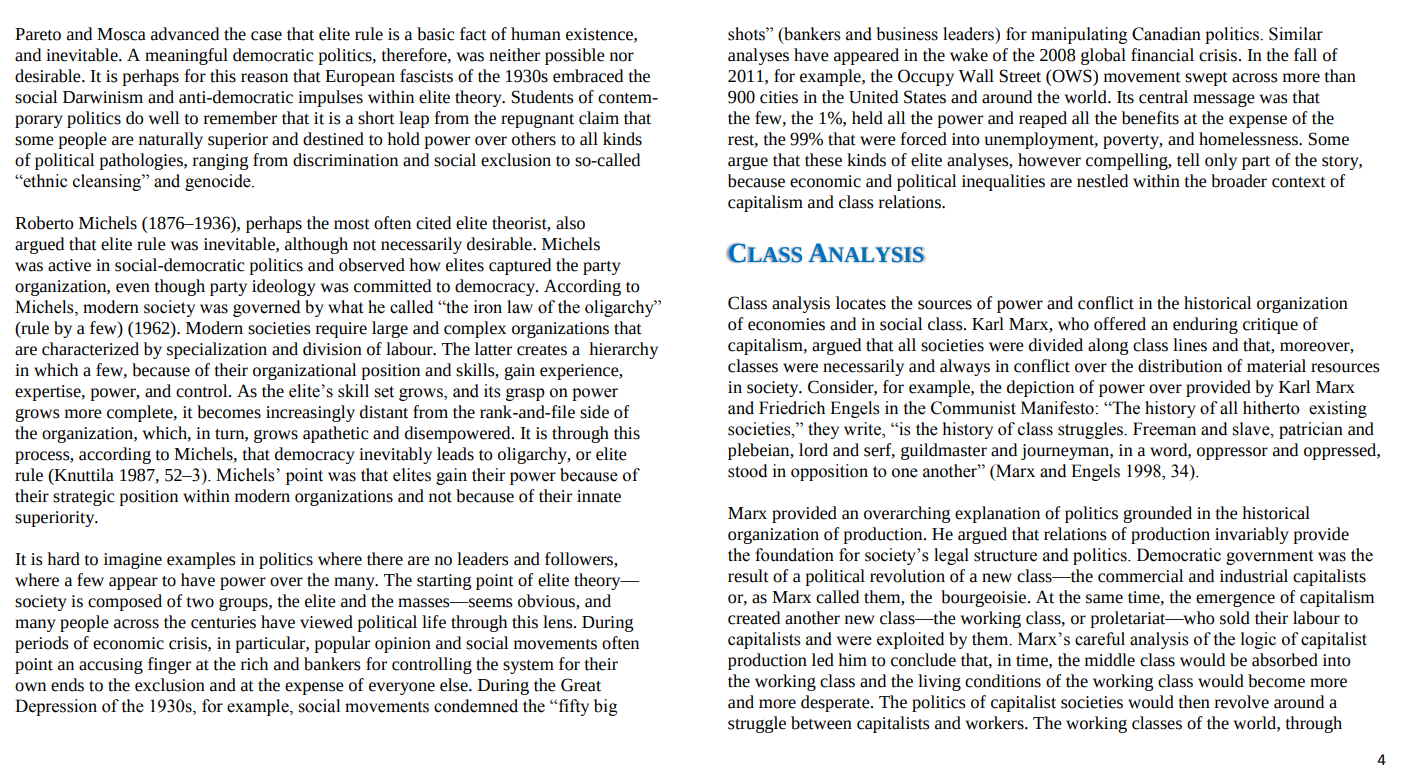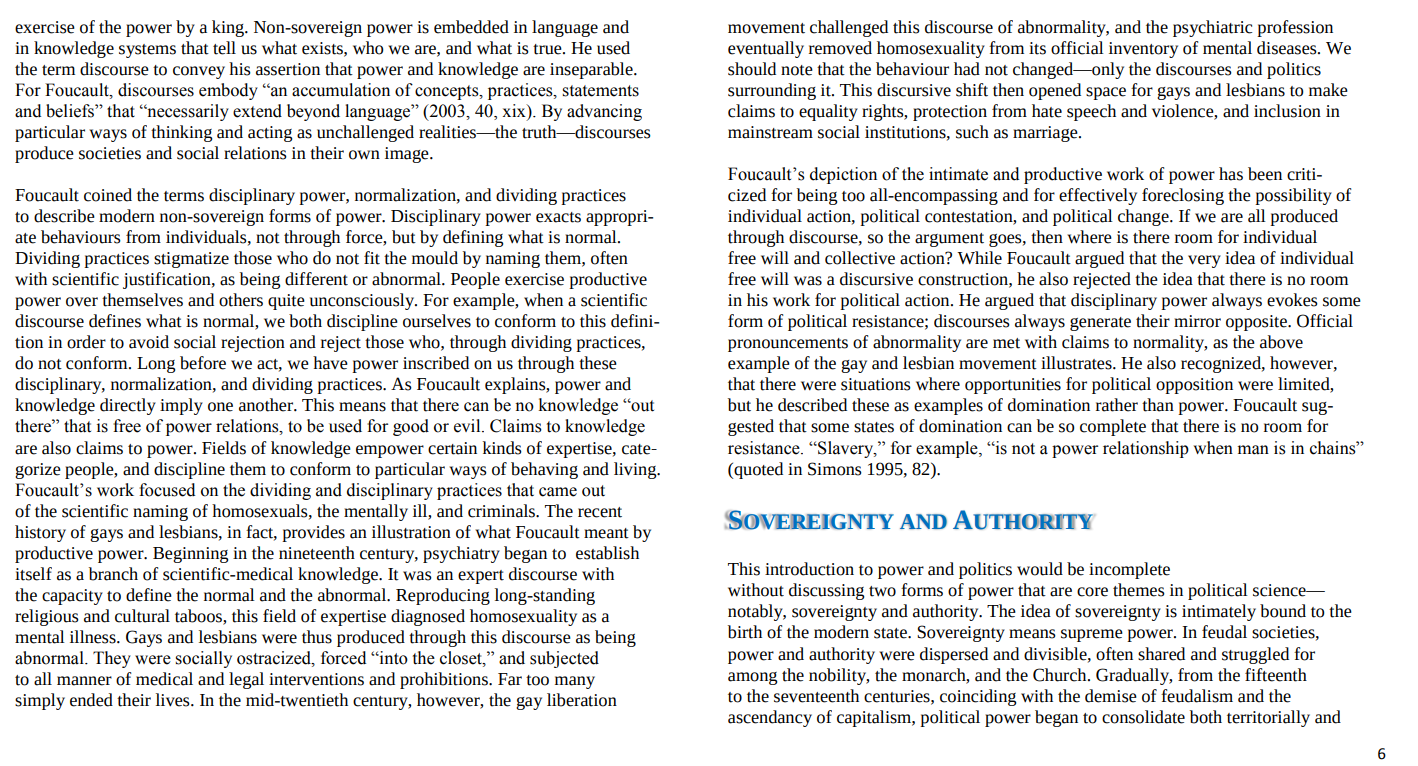This small essay by Janine Brodie called “Power and Politics” has several other issues, but their most frustrating one is their outright DISMISSAL of Marxist class analysis for the stupidest reasons. Economic determinism? I guess if you yearned to softly dismiss marx by misrepresenting him.
God I fucking hate poli sci majors.
The previous page:

The next one:

I’m not the brightest crayon in the box but is it just me or does Doctor Brodie somehow make politics and power some sort of vague, unsolvable mystery? Like fr I don’t want just an echochamber of nodding heads plz help am I in the wrong?
I need help putting words to my issues with it.

That quote also telescopes hundreds of years of development through a bourgeois lens, no less. One only need read the three paragraphs in the Manifesto before M&E say that capitalism has simplified classes to see the echo of a subtler conception of class than is presented in Brodie’s work. That is, even Brodie’s limited actual engagement seems to take ideas/quotes out of context and uses them as gotchas.
I wouldn’t say the quote necessarily attributes to Marx the belief that ‘democracy was achieved by bourgeois revolution’. There’s a way of reading that claim as Brodie’s garbled understanding of bourgeois revolution followed by a claim about Marx’s class analysis. But here we see an alternative problem beneath the text.
If we read Brodie instead as saying that Marx only called the ‘new class—the commercial and industrial capitalists … the bourgeoisie’, the question is, does Brodie agree? Is Brodie sceptical that a bourgeois class exists at all? Is the bourgeoisie only the bourgeoisie according to Marx?
It wouldn’t be the first time a bourgeois writer has rejected the notion of a bourgeois revolution (the underlying topic, here). But that rejection usually starts by claiming that humans have always lived under or driven (teleologically) towards capitalism; i.e. there is no ‘new’ class of bourgeois because the bourgeois always existed (just don’t look too closely at feudal lords, etc). It doesn’t usually reject the existence of a bourgeoisie, although that term is usually replaced with the friendlier-because-more-obscure ‘capitalists’.
That’s a problem with the writing, rather than your interpretation. It’s making me squint, too, and it’s hard to know who is supposed to be saying what without any real engagement with what Marx (or specific Marxists) have said.
Fair enough if Brodie has unknowingly read a summary of a summary of e.g. GA Cohen but that needs to be made clear. The problem is that academics can write shit like this but they must uphold the pretense that it’s rigorous. So they can’t start admitting what or who they have actually read or to what extent.
for some reason it won’t let me post more than 6 photos, which is weird. I’ll try sending them in the morning
i can link the full 9 pages for you, here
part 1
spoiler
___
Thanks for this, I’ll read through it later.
In the meantime, I’ve had a quick look at the author. What I will say is that successful career academics like Brodie are good for one thing in particular: they tend to represent the orthodox state of affairs even if they create their own brand around the edges. This means you can read a few of their articles, maybe a book (skimming the waffle sections) for a snapshot of the mainstream, ‘critical’ but uncontentious thought.
When you write for an academic audience that has been trained to think in a certain way, you’re at disadvantage as a Marxist. You know they’ll reject you if you push the Marxism too fast or too hard before you have demonstrated your intellectual credentials.
Opening an essay with close, analytical, and critical engagement with writers like Brodie let’s you show your reader (examiner) that you know what you’re supposed to know. This can also help to lure the reader in to accept your challenges, left with the question, ‘okay, so now what?’
And that’s when you can hit them with the Marxism, with or without directly referencing (well known) Marxists (including Marx). For example, you can present evidence of what’s been said elsewhere in this thread about the uselessness of lower, middle, upper class by asking what’s similar about an senior engineer at Tesla (‘upper class’) and the owner, Musk. This lets you question the orthodoxy in a way that leads back to Marxism without letting the reader know until it’s too late for them to reject your argument on it’s face for being Marxist.
This approach doesn’t always work and it’s not a fixed blueprint (a lot also depends on the learning outcomes and the marking criteria, etc) but maybe it’ll help you power through when you’re given other anti-Marxist readings.
Tagging @SpaceDogs@lemmygrad.ml as you might be interested in this thread if you haven’t seen it.
thank you for the advice!
Me thinks Janine Brodie has only read the Communist Manifesto…
I don’t really have an excuse as to why it took me so long to read this thread, but I finally did and I wanted to thank you for tagging me. Your comment (and all your comments) is very useful for me as a student and future professor, especially that bit about being a Marxist in academia. If the paper is not about Marx directly I really do have to censor myself quite a bit by talking about Marxist ideas and views but not referencing Marxists themselves for fear of being penalized.
To me, this piece by Brodie comes across as Political Science 101. It’s incredibly status quo and doesn’t say much of anything outside of what is already well established. I’m not going to speculate what year OP is in, but this is not out of the realm of first year PoliSci. While I don’t recall ever reading anything by Brodie in any of my classes, I’ve read and been lectured to in the same language. She is also a Canadian academic so maybe thats also why I am sensing severe overlap.
Glad you found the discussion helpful.
I realise this was a month ago now. Can’t believe I’ve not posted for that long!